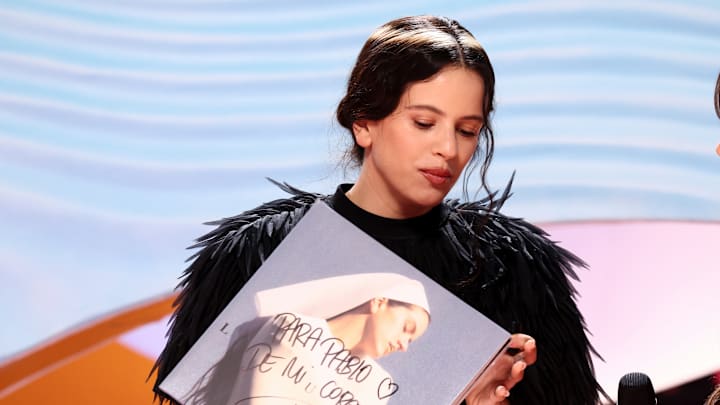On November 7th, Spanish popstar Rosalía dropped her long-awaited album, Lux. Like most of her artistic creations, it hasn't been exempt from controversy (from the use of Catholic iconography to the unavoidable cries of cultural appropriation).
However, most people agree that it's an absolute masterpiece. Myself included. Did I cry when I first listened to Lux? Absolutely. Twice.
The Catalan artist has gone on record to say that there was "no AI at all" involved in her creative process. In an interview with France Inter, she describes the album as "deeply human," a statement that stands out amongst a seemingly infinite slew of AI slop.
How good is Rosalía's latest album, 'Lux'?
It's undeniable that algorithms have changed the way music (and pretty much everything else) is marketed. Just look at this year's Grammy's Best New Artist nominees, most of which have either had their songs trending on TikTok or have a social media presence that is as notorious as their music.
Though I must say I think this album is definitely setting her up for another Grammy next year, hopefully in the pop category. It's hard to tell which part of Lux is bolder: its sonority or its political stance.
The album is a masterclass in hybridization. Electronic and acoustic, aggressively modern as well as timeless. Juxtaposing images, languages, and techniques, she manages to borrow the best from every world and integrate it in a way that feels seamless and deliberate.
This is what happens when an artist has a crystal clear vision and a label is brave enough to give them creative control, no questions asked.
Of course, it's not hard to see why Sony would trust Rosalía's artistic vision after the outstanding success of both her previous albums, Motomami and El Mal Querer.
Every narrative decision in Lux feels calculated. The mix between physical and digital instruments potentializes them both.
"Reliquia" is a fantastic example of this (as well as my favorite track, personally): long synth pedal notes blend in with uniquely choppy virtual strings at speeds which would be impossible to achieve with physical instruments.
A sound which would usually masquerade as acoustic shines in its own right by not trying to pass off as anything other than a computer, and it's absolutely brilliant.
Non-digital strings are given their own moments to shine, emphasizing the prechorus and making the return of digital instruments feel even more aggressive in the chorus. Rosalía knows exactly how to use contrast to her advantage.
Her mastery of contrast can also be seen in the distinct sections and structure both within each song and throughout the album as a whole.
Rosalía is an artist who understands that silence is as much a vital part of music as any other instrument. Each track is an emotional journey in itself, but listening to the entire album will take you through so many vastly different emotional places.
She's not shy to blend different production techniques, too. This album dilutes the borders between genres. If you ever get a chance to ask a producer what it's like to record and produce classical music vs. electronic music vs. pop, they'll tell you they all use completely different techniques.
Just to give you an idea, pop is known for its aggressive compression (resulting in a homogenous sound and equal amounts of spotlight for each instrument).
Electronic music is a little more experimental, notorious for its automated effects like the side-to-side panning we hear towards the two-minute mark in "Porcelana" (best appreciated with headphones).
Classical music is one of the few remaining genres where all musicians record together instead of visiting the studio one by one. It relies heavily on microphone placement to create spatial localization, turning the venue itself into a sort of instrument because of the way reverberations interact.
Now imagine how hard it must be to combine all of these techniques and still achieve a polished, integrated sound.
Props to her fellow producers Noah Goldstein, Dylan Wiggins, Caroline Shaw, Jake Miller, Elliott Kozel, Pharrell Williams (yes, that Pharrell Williams), and El Guincho (the same producer behind her 2019 hit and J Balvin feature, "Con Altura").
Rosalía also pushes the boundaries of each instrument's usual role within a song.
For instance, the use of "pizzicato" (a technique where an orchestra's strings are plucked rather than stroked with a bow) and oud-like (Egyptian string instrument) in "Divinize" results in an almost percussive sound, like she's using the strings as a drum section.
Not to mention this. Woman. Can. SING. Her singing feels otherworldly, almost siren-like. It's like she wrings your heart out with her voice.
Her vocal range isn't something we hadn't been blown away by on her previous records, but it never ceases to amaze me. She transitions in and out of her chest voice and falsetto like it's nothing.
Her flamenco-style training really shows (she has a degree in music, and her breakout album El Mal Querer resulted from her college dissertation).
Of course, there are also countless nods to her flamenco origins in songs like "Mundo Nuevo," "De Madrugá," and most notoriously "La Rumba del Perdón," which even features Estrella Morente, a legendary flamenco singer whose legacy cannot be understated.
As part of the press tour for Lux, Rosalía did an interview with the New York Times, which I found interesting from start to finish, but my favorite part is when she talks about whether her music can be defined as pop or not.
"There has to exist another way of making pop. Björk proved it. Kate Bush proved it. I need to think that what I'm doing is pop, 'cause otherwise I don't think I'm succeeding."
This album is the definition of going for it. It's grand, it's dramatic, it's maximalist. Chopin and Monet would be proud: it's a revival of Expressionism. You're absolutely right, Rosalía. AI could never.
